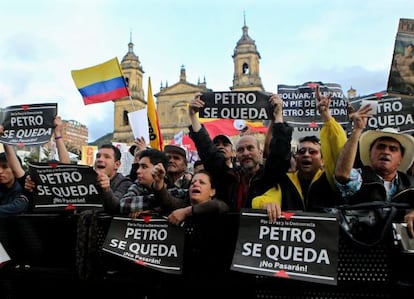Fired Bogota mayor demands president’s intervention
Former guerrilla member declares war on the inspector general who sacked him

Colombians have found themselves divided over the past week after the country's inspector general announced that he was sacking Bogota's mayor, Gustavo Petro, for violating free market principles stemming from the cancelation of city garbage contracts last year.
Petro is a former M-19 guerrilla who laid down his arms and entered politics in 1991 -- and he plans not to step down without a fight.
On Saturday, thousands of people gathered in front of City Hall in Bogota in support of Petro, who was sacked on December 9 by Inspector General Alejandro Ordóñez. The cancelation of the garbage collection contracts led to massive trash pile-ups throughout the city in December 2012, forcing the mayor to call back the private contractors. Ordóñez also banned Petro from holding public office in any capacity for the next 15 years.
The controversy is now centered on the enormous powers held by the inspector general, who not only has the authority to investigate public officials for corruption but also to pass judgment on the management of resources.
Ordóñez, who is serving his second term, is a very controversial figure in Colombia. According to figures published in Colombian dailies, he sacked 828 mayors and 49 governors during his first term as inspector general. "Currently, the inspector general's office is investigating 90 percent of the country's mayors and all governors," Semana magazine reported.
For his part, Petro -- whose city administration has come under fire because critics feel that he is incapable of governing -- has been able to drum up support from bogoteños and warned that Ordóñez wants to derail the current peace talks in Havana between the government of President Juan Manuel Santos and representatives of the Revolutionary Armed Forces of Colombia (FARC).
According to figures published in Colombian dailies, Ordóñez sacked 828 mayors and 49 governors during his first term
He has called on Santos, whom he met with on Tuesday, to intervene. But the president said that he will not get involved in the matter and respects judicial decisions. Besides the mayor, Santos said that he will meet with the inspector general, attorney general and comptroller to seek a solution to the crisis, but within the "institutional framework."
"Let the president, who is defending peace for Colombia, come out on the streets to defend the Inter-American Human Rights Convention," Petro told his supporters, who carried placards that read "Petro stays."
"Let him come out on the streets to defend the Constitution, which states that it is the president – not the inspector general – who is bound legally to replace a mayor."
During his two-hour speech, Petro explained that he cannot be replaced because he has not been convicted of any crime. His lawyer, Julio César Ortiz, said he will file an appeal on December 30.
Petro claims Ordóñez has been using his post for political purposes. Ordóñez, who has not made any public comments since the decision, is a member of the conservative coalition bloc of former President Álvaro Uribe, who is against the peace talks in Havana because he believes the government should not deal with terrorists. Ordóñez has said in the past that he is willing to publicly defend his responsibilities under the law as inspector general.
The mayor, who will remain in office until the inspector general's ruling is ratified, warned that by the decision Colombia is showing the world that "democracy is disposable."
The entire affair has captured the attention of the international press, which has questioned the powers of an inspector general who can replace any mayor that is democratically elected.
Newly appointed US Ambassador Kevin Whitaker also entered the fray when he said last Wednesday that Petro's ouster could "erode" the ongoing peace negotiations between the Colombian government and FARC rebels in Havana. An angry Bogota responded with a statement asking Whitaker, who has not been confirmed by the US Senate, to stay out of Colombian internal affairs.
A similar incident occurred when Todd Howland, the United Nations representative in Colombia, asked to analyze the ruling against Petro but was told by Interior Minister Aurelio Iragorri that international organizations cannot take sides in this controversy.
Tu suscripción se está usando en otro dispositivo
¿Quieres añadir otro usuario a tu suscripción?
Si continúas leyendo en este dispositivo, no se podrá leer en el otro.
FlechaTu suscripción se está usando en otro dispositivo y solo puedes acceder a EL PAÍS desde un dispositivo a la vez.
Si quieres compartir tu cuenta, cambia tu suscripción a la modalidad Premium, así podrás añadir otro usuario. Cada uno accederá con su propia cuenta de email, lo que os permitirá personalizar vuestra experiencia en EL PAÍS.
¿Tienes una suscripción de empresa? Accede aquí para contratar más cuentas.
En el caso de no saber quién está usando tu cuenta, te recomendamos cambiar tu contraseña aquí.
Si decides continuar compartiendo tu cuenta, este mensaje se mostrará en tu dispositivo y en el de la otra persona que está usando tu cuenta de forma indefinida, afectando a tu experiencia de lectura. Puedes consultar aquí los términos y condiciones de la suscripción digital.








































